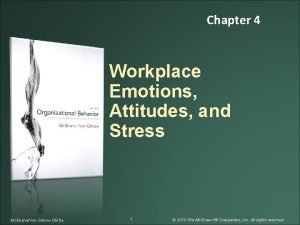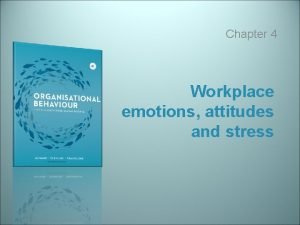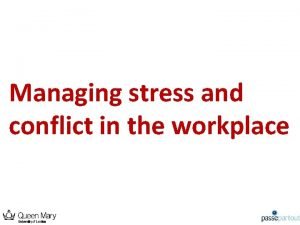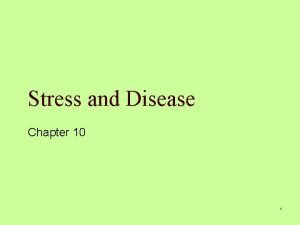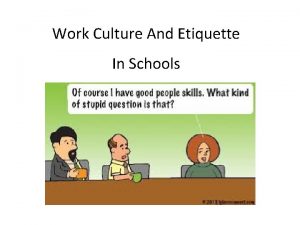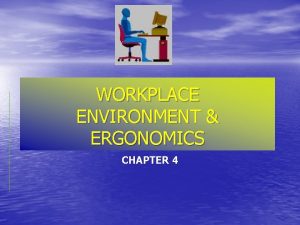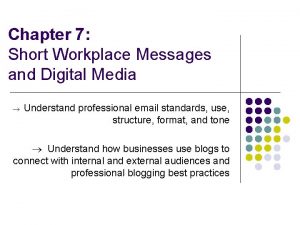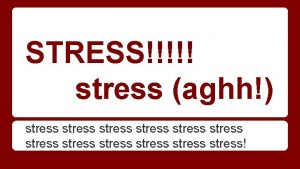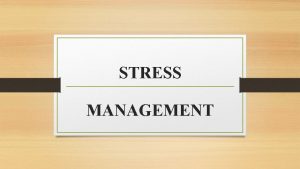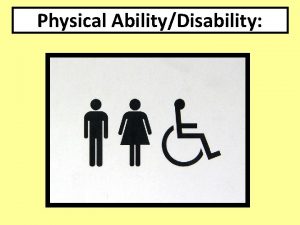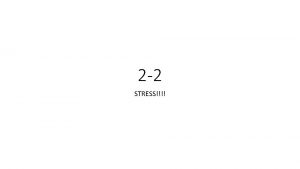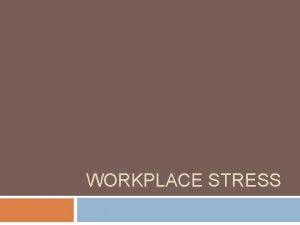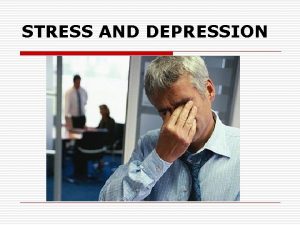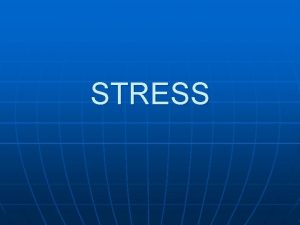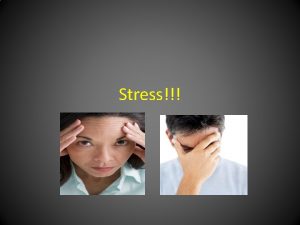WORKPLACE STRESS WORKPLACE STRESS Definition A physical and













- Slides: 13

WORKPLACE STRESS

WORKPLACE STRESS. Definition: A physical and emotional response. Fight or flight = adrenaline release = pulse up, breathing deepens, muscles tense. Short term is OK, long term, continuous is not

CAUSE A conflict between…. the demands on a worker and the amount of control the worker has over meeting these demands.

EFFECTS The workplace can affect your physical and mental health. Illness, absenteeism Morale, values Your health will affect your productivity and efficiency. Speed Accuracy Quality Co-operation Effort Honesty

RESPONSIBILITIES Therefore, employees, employers, and workplace designers share the responsibility and an interest in creating and maintaining a safe and healthy workplace.

JOB CONDITIONS THAT CAN CREATE STRESS: The Design of Tasks Heavy workload Infrequent breaks Long working hours and shift work A hectic pace Routine tasks that have little meaning Under-utilization of skills Little sense of control

JOB CONDITIONS THAT CAN CREATE STRESS: Management style Lack of participation in decision-making Poor communication in the organization Lack of family-friendly policies

JOB CONDITIONS THAT CAN CREATE STRESS: Interpersonal relationships Poor or limited social environment Lack of support from co-workers Harassment or discrimination

JOB CONDITIONS THAT CAN CREATE STRESS: Work roles Conflicting or uncertain job expectations Too much responsibility Too many roles to fill

JOB CONDITIONS THAT CAN CREATE STRESS: Career Concerns Job insecurity Lack of opportunity for growth No advancement or promotion Change without preparation or warning

JOB CONDITIONS THAT CAN CREATE STRESS: Environmental Conditions Unpleasant or hazardous physical conditions Crowding, noise, air pollution, ergonomic problems.

SYMPTOMS OF STRESS Frequent anger and frustration Nail biting or teeth grinding Decreased productivity at work Absenteeism Avoidance of others Change in personal appearance Sleep disorders Depression and anxiety Tense muscles and backache Pounding or racing heart Increased perspiration Forgetfulness and lack of concentration A desire to run away or cry Loss of confidence Irritability or edginess

MANAGING STRESS. Eat properly Exercise regularly Get enough sleep Form realistic goals Learn to relax Create or maintain a stable personal Life Manage what is controllable Modify what cannot be controlled Prioritize Avoid multitasking Develop or maintain a sense of humor
 Workplace emotions, attitudes, and stress
Workplace emotions, attitudes, and stress Workplace emotions, attitudes, and stress
Workplace emotions, attitudes, and stress Stress and conflict introduction
Stress and conflict introduction True strain formula
True strain formula Chapter 10 stress responses and stress management
Chapter 10 stress responses and stress management Physical differences in the workplace
Physical differences in the workplace Normal stress
Normal stress Physical rate fences
Physical rate fences Physical fitness grade 9
Physical fitness grade 9 Work etiquette definition
Work etiquette definition Teachers etiquette professionals
Teachers etiquette professionals Virginia workplace readiness skills
Virginia workplace readiness skills Workplace environment and ergonomics
Workplace environment and ergonomics Short workplace messages and digital media
Short workplace messages and digital media
